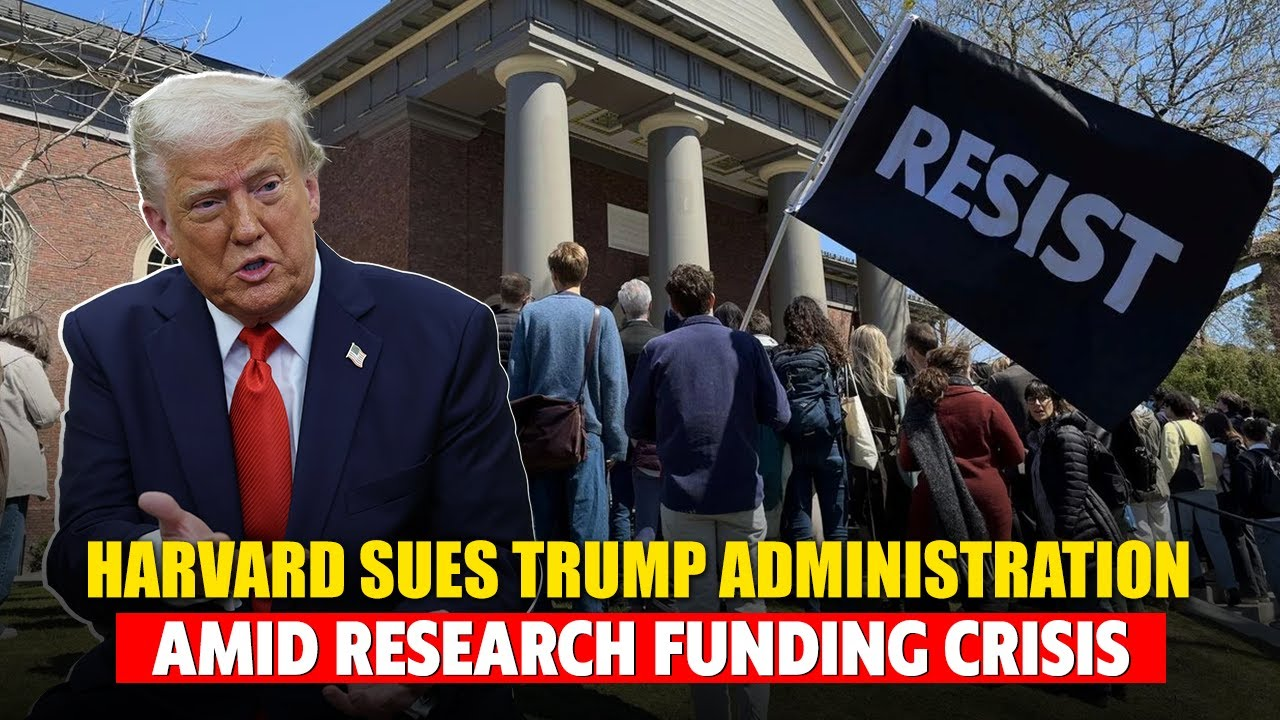The Harvard research funding crisis has plunged the university’s groundbreaking projects into uncertainty, marking a pivotal moment for officials and researchers alike. Just hours following Harvard’s rejection of the Trump administration’s demands, a stop-work order targeted pivotal organ-on-a-chip technology studies led by Don Ingber, impacting over $19 million in contracts. The freeze on approximately $2.2 billion in research funding from the federal government has sent ripples throughout the research community at Harvard University, jeopardizing innovation in scientific fields that have traditionally powered the American economy. With lawsuits filed and tensions high, the need for rapid decision-making surrounding talent retention and project continuity has become increasingly critical. As researchers scramble to find alternative funding sources, the survival of essential research initiatives hangs in the balance, illuminating the profound implications for innovations that drive our society forward.
The funding emergency at Harvard University represents a significant challenge to research and innovation initiatives across the academic landscape. Following a contentious standoff with the Trump administration, a stop-work directive has disrupted key projects, including those utilizing organ-on-a-chip technology led by esteemed researchers like Don Ingber. The interruption of approximately $2.2 billion in government funding could have severe repercussions for the innovation economy, which relies on a robust collaboration between academia and federal institutions. In response to the crisis, many talented researchers are facing potential displacement, raising urgent concerns about the future of their significant contributions to science and technology. As the university navigates this complex situation, the ramifications of this funding crisis extend far beyond its walls, potentially altering the course of numerous vital research endeavors.
The Impact of the Stop-Work Order on Harvard’s Research Agenda
The recent stop-work order imposed on Harvard University has sent ripples through its vibrant research community, significantly impacting ongoing projects such as those led by Don Ingber at the Wyss Institute. This order halted critical investigations that leverage organ-on-a-chip technology for groundbreaking applications, including the assessment of radiation damage to human organs and the modeling of microgravity effects on astronauts. As the government froze about $2.2 billion in research funding, the uncertainty surrounding the future of these projects sparked immediate concerns among researchers, students, and investors alike. What this means for the future of innovation in America is profound, as halted projects often result in wasted resources and lost scientific advancements that can take years to recreate.
Furthermore, the halt in research not only impacts current studies but also jeopardizes funding opportunities and potential collaborations that fuel the innovation economy. As researchers scramble to secure alternatives or shift their focus to other grants, the foundation of many scientific advancements faces instability. The stop-work order raises larger questions about the sustainability of federal support for crucial research initiatives, emphasizing the need for an urgent reevaluation of how government and academia can collaborate in fostering environments conducive to ongoing scientific discovery.
Navigating the Harvard Research Funding Crisis
In light of the recent crisis surrounding Harvard’s research funding, many within the academic community are grappling with uncertainty and concern for their futures. Don Ingber, director of the Wyss Institute, described the distressing situation where researchers face layoffs and project cancellations due to the abrupt funding freeze. This crisis not only threatens the progress of scientific research but also the stability of talented individuals associated with these projects. The turmoil stemming from the funding cuts compels researchers to reconsider the viability of their long-term careers within the U.S. academic landscape, fostering fears that the U.S. may lose its standing as a primary destination for global scientific talent.
Ingber’s insights highlight a crucial aspect of this funding crisis—the potential loss of innovation that can arise from a weakened government-academic partnership. As America’s innovation engine sputters, it becomes increasingly difficult to advocate for necessary investments in research initiatives that could lead to advancements in technologies we rely on every day, such as medical devices and AI applications. The lingering effects of the research funding crisis at Harvard serve as a beacon of warning about the broader implications of disrupting the fundamental relationship between talented researchers and the support from both private and public sectors that encourage innovation.
Organ-on-a-Chip Technology: A Key Player in Modern Research
The organ-on-a-chip technology spearheaded by Don Ingber at Harvard is not just a scientific curiosity; it holds profound implications for future medical and aerospace research. Designed to simulate the physiological responses of human tissues, these chips offer unprecedented opportunities for testing drug efficacy and understanding illness mechanisms without relying on traditional animal testing. They are instrumental for research areas including radiation exposure risk assessments—an area made even more critical by the increasing use of nuclear technology and the associated health risks. By halting critical research, the U.S. risks missing out on developing essential solutions for public health challenges.
Moreover, the ability to replicate human organ systems within a chip elevates the potential for personalized medicine and targeted therapies. As projects using organ-on-a-chip technology progress, the path towards innovative drug discovery becomes clearer. The work at the Wyss Institute exemplifies how interdisciplinary initiatives harnessing engineering, biology, and technology can lead to transformative healthcare solutions. With the current disruption, scientists not only face the threat of unraveling years of research but also the need to advocate strongly for funding that supports these essential projects in the quest for public health advancements.
The Role of Harvard University in the Innovation Economy
Harvard University has long been a pillar of the innovation economy, exemplifying how academia can drive technological advancements and foster economic growth. The institution has nurtured talent and cutting-edge research projects that propel industries forward, providing a constant influx of new ideas and products that benefit society. However, the recent funding crisis challenges this legacy, as the coherence between academic pursuits and government support is threatened by administrative policies that do not align with the needs of the scientific community.
As Ingber pointed out, the innovation economy relies heavily on a collaborative environment where breakthrough research funded by government initiatives leads to commercial successes. Losing such funding not only stalls existing projects but may also discourage new innovations from emerging. The legacy of Harvard as a champion of research could be compromised unless a balanced approach is reinstated, where steady support reinforces the developmental processes crucial for maintaining the U.S. position at the forefront of technological advancement.
Consequences of Research Disruption for Global Collaboration
The disruption caused by the funding crisis at Harvard sends refractions through the global scientific community, raising concerns about the ripple effects on international collaboration. As researchers express fear for their career stability, many are reconsidering whether to pursue opportunities in the U.S., a country previously viewed as an intellectual haven. This discontent reverberates, and as potential talents may seek opportunities in more stable environments abroad, the U.S. could face a significant brain drain, losing out on groundbreaking ideas and innovations that could emerge from a diverse pool of international researchers.
Ingber’s experience illustrates the psychological impact felt across his team, where scientists worry about job security and the viability of their ongoing research contributions. The current environment not only affects recruitment efforts but also the collaborative relationships that form the backbone of pivotal research initiatives. Consequently, it is essential for U.S. institutions to recommit to fostering a welcoming atmosphere for scientific inquiry, where stability and support encourage cooperation and unity on a global scale.
The Future of Biomedical Research Amidst Funding Challenges
Looking forward, the future of biomedical research hinges on addressing the current funding challenges head-on. As highlighted by Ingber, projects that utilize innovative technologies such as organ-on-a-chip systems provide potential solutions for pressing health dilemmas yet face uncertainties due to the stop-work orders. In this precarious environment, it’s imperative for researchers and stakeholders to advocate for a dependable funding base that does not falter amid political frictions. Ensuring that funding channels remain steady and secure can allow for the continuity of groundbreaking research that enhances both our medicinal capabilities and societal resilience.
Moreover, as the innovation economy shifts, it generates new opportunities that must be harnessed through policy reforms and committed partnerships between government and research institutions like Harvard. Essential for maintaining the momentum of significant discoveries, this collaboration will significantly help stabilize funding streams and promote new ventures that can contribute enduringly to the health sector and beyond. With the proper support, researchers can push the boundaries of science, leading to advancements that not only enhance lives but also sustain economic growth.
Safeguarding Talented Researchers in Times of Crisis
Amid the uncertainties triggered by the federal funding freeze, safeguarding talented researchers has become paramount for leading institutions like Harvard. As Prof. Ingber noted, the emotional toll on scientists facing scrutiny and potential layoffs weighs heavily on their performance and decision-making capabilities. Protecting these assets is critical, as losing skilled professionals to other countries diminishes the overall strength of American research and compromises collaborative efforts necessary for future breakthroughs.
To retain talent, institutions must ensure open communication about ongoing developments and foster a supportive environment amidst external pressures. Potential strategies could include offering temporary assignments, internal funding opportunities, and professional development to assure researchers that they remain valued assets in an uncertain landscape. Reassuring teams about their roles even during turbulent times can help maintain morale and promote continuity, which is fundamental for driving innovation forward.
Urgency for Advocacy in Research Funding Policies
The unfolding crisis at Harvard illuminates the urgent need for advocacy concerning research funding policies. As the federal government places restrictions that directly impact academic freedom and scientific exploration, researchers must unite to articulate the vital importance of sustained investment in the innovation economy. Advocacy must emphasize how comprehensive programs not only enhance the U.S. scientific portfolio but also boost domestic and global health outcomes, showcasing the interconnectedness of research investment and real-world applications.
Research funding isn’t simply financial support; it’s an endorsement of the value placed on scientific inquiry and creativity that have historically propelled America ahead. Engaging policymakers to address the needs of researchers and institutional barriers will be crucial to regain confidence in the system that nurtures innovation. Advocating for a more favorable research environment allows the scientific community to collaborate effectively, ensuring that America remains a global leader in research and technological development.
The Role of the Wyss Institute in Future Innovations
The Wyss Institute, under the directorship of Don Ingber, represents a frontier for innovation, addressing critical challenges through its cutting-edge research focused on biologically inspired engineering. As seen in their utilization of organ-on-a-chip technology, the Institute exemplifies how interdisciplinary collaborations can yield transformative insights into biomedical applications, potentially reshaping industries and improving health outcomes. However, as the funding crisis looms over these initiatives, the Institute’s future and ongoing projects face jeopardy without stable financial backing.
In ensuring the Wyss Institute continues to thrive, it is vital to highlight the significance of such innovative ecosystems, building a case for funding focused not only on immediate returns but on long-term benefits and societal advancements. This approach can underline the importance of continued investment in unique entities like the Wyss, which are key drivers of the innovation economy, capable of fostering breakthroughs that could redefine human health and capacity. By emphasizing the Institute’s critical role, advocates can effectively rally support to secure the necessary funding and infrastructure to promote sustained innovation.
Frequently Asked Questions
What is the Harvard research funding crisis and how does it affect projects like organ-on-a-chip technology?
The Harvard research funding crisis refers to the recent freezing of approximately $2.2 billion in research funding by the federal government, which has directly impacted projects at Harvard University, particularly those led by researchers like Don Ingber at the Wyss Institute. Ingber’s organ-on-a-chip projects, crucial for modeling radiation effects and other significant health impacts, received a stop-work order, halting advances and risking the progress of research vital to areas like space exploration and cancer treatment.
How has Harvard University responded to the research funding crisis and the stop-work order?
In response to the research funding crisis and the stop-work order, Harvard University filed a lawsuit against the federal government, claiming that the demands made by the Trump administration represent an illegal overreach. This legal move aims to restore funding and support for critical research initiatives, such as the organ-on-a-chip technology projects that are essential for understanding human organ damage from various environmental factors.
What are the implications of the research funding crisis on American innovation and the economy?
The Harvard research funding crisis poses serious implications for American innovation and the economy. As highlighted by Don Ingber, the disruption of funding hampers the progress of groundbreaking research that has historically driven technological advancement. This crisis threatens the collaborative relationship between government and academia, crucial for fostering innovation and sustaining economic growth.
What are organ-on-a-chip technologies and why are they significant amidst the Harvard research funding crisis?
Organ-on-a-chip technologies are innovative systems that replicate human organ functions on a miniature scale, allowing researchers to study effects such as radiological damage or microgravity exposure. Amidst the Harvard research funding crisis, these technologies are particularly significant for assessing risks in scenarios such as space travel or radiation therapy for cancer patients—areas that require ongoing research despite the current funding restrictions.
How are researchers at Harvard coping with the challenges posed by the funding crisis?
Researchers at Harvard, like Don Ingber, are coping with the challenges posed by the funding crisis through strategic shifts in project management and personnel. Ingber emphasizes the importance of safeguarding researchers’ roles by transitioning them to other projects and seeking alternative funding sources, while also prioritizing communication and support to alleviate the stress felt by affected staff and students.
What future challenges could arise from the Harvard research funding crisis for attracting global talent in science?
The Harvard research funding crisis could lead to significant challenges in attracting global talent to the field of science. As expressed in the experiences of researchers feeling uncertain about opportunities in the U.S., the instability may deter international scientists from pursuing positions at institutions like Harvard. This decline in interest could hinder the innovation economy, which relies on a diverse pool of talent to drive forward scientific and technological advancements.
In what ways may the research funding crisis at Harvard affect ongoing and future research studies?
The research funding crisis at Harvard may severely impact ongoing studies by halting experiments that cannot continue without funding. It jeopardizes the progression of critical research projects, particularly those involving organ-on-a-chip technologies, affecting milestones required for advancements in health and space exploration. Future studies may also suffer from reduced collaboration and investments, limiting potential breakthroughs in various scientific fields.
| Key Points |
|---|
| Harvard faced a significant blow to its research funding, with $2.2 billion frozen due to government demands. |
| Don Ingber’s organ-on-a-chip projects were directly impacted by the government’s stop-work order, which halted research crucial to medical advancements. |
| The implications of halted research extend to students and postdoctoral fellows, complicating their educational and career trajectories. |
| The projects have substantial value for medical research, particularly in modeling radiation damage and preparing for space missions. |
| Fear of instability is driving researchers, especially immigrants, to reconsider their positions at Harvard and in the U.S. |
| The actions taken reflect a broader trend of uncertainty in American research funding, impacting innovation. |
Summary
The Harvard research funding crisis has emerged as a significant issue following the government’s freeze of $2.2 billion in funding, directly affecting many projects vital to scientific advancement. This crisis not only halts important research led by esteemed faculties like Don Ingber but also creates an atmosphere of fear and uncertainty among researchers and students alike. The need for sustained innovation in the U.S. relies heavily on government and academia partnerships, making the resolution of this funding crisis critical to maintaining America’s global competitive edge in research and technology.



